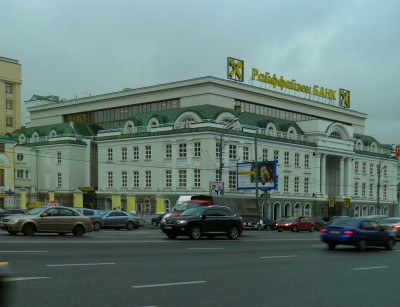Russian Court of Appeal Confirms Billion-Dollar Fine Against Raiffeisen Subsidiary
A Russian appeals court in St. Petersburg has confirmed the decision of a court of first instance, according to which the Russian subsidiary of Raiffeisen Bank International (RBI), AO Raiffeisenbank, must pay over two billion euros to the Cypriot company Rasperia Trading Limited. However, this could also mean two exemptions at the same time - and one of them in Austria.
 The billion-euro lawsuit between the Russian Rasperia Trading Limited and the Austrian Raiffeisen Bank International (RBI) enters the next round. / Picture: © Wikimedia Commons; salech hcelas, CC BY 3.0 (https://creativecommons.org/licenses/by/3.0/deed.en)
The billion-euro lawsuit between the Russian Rasperia Trading Limited and the Austrian Raiffeisen Bank International (RBI) enters the next round. / Picture: © Wikimedia Commons; salech hcelas, CC BY 3.0 (https://creativecommons.org/licenses/by/3.0/deed.en)
The 13th Commercial Court of Appeal in St. Petersburg upheld a ruling by the Kaliningrad court ordering AO Raiffeisenbank to pay 2.044 billion euros in damages to Rasperia - as well as to take over its STRABAG shares. The plaintiff, once under the control of the sanctioned oligarch Oleg Deripaska, accused the Raiffeisen Group and several major STRABAG shareholders of unlawfully imposing sanctions on them and expropriating them economically.
Although Deripaska has officially no longer been the owner of Rasperia since the end of 2023, the actual ownership structure remains unclear. Experts suspect that the oligarch continues to profit in the background. The Russian judiciary is not very transparent on this issue - and, according to observers, clearly close to the Kremlin.
RBI sets out on counter-offensive in Austria
For RBI, the ruling represents a massive financial and symbolic blow - but at the same time it also marks the activation of a prepared strategy: in Austria, the bank wants to access the frozen assets of Rasperia to compensate for the payment. Specifically, this involves: 28.5 million STRABAG shares (value: >2 billion euros), Dividend claims amounting to 128 million euros, and Special payments from capital measures of around 258 million euros.
As reported in the Austrian newspaper "Die Presse", RBI is planning to sue for these assets before the Vienna Commercial Court - to resell the STRABAG shares immediately after their acquisition in court. The bank emphasizes that it has no long-term ownership interests in STRABAG.
EU law as a joker?
The success of this strategy depends largely on EU sanctions law. Lawyer Gabriel Lansky explains: "If assets are taken from a company in Russia via a court ruling, this does not constitute a breach of sanctions. Just as little as a clawback in Austria, as long as no money flows to a sanctioned person." Lawyer Philip Goeth adds: “The EU has now created regulations to protect Western companies from so-called ”robber baron lawsuits" from Russia.
This means that RBI could legally turn the tables - provided that the Austrian courts recognize the legal basis for a “cold expropriation” by Russia. However, as legal expert Gregor Rathkolb points out, there has been no precedent to date. The presentation of evidence is likely to be complex and lengthy - with proceedings lasting up to two years.
Ruling as a door opener for withdrawal from Russia?
Another effect of the ruling: It paves the way for the planned sale of the Raiffeisen subsidiary in Russia. Due to the lawsuit, any change of ownership was previously blocked - this block could now be lifted. RBI has been looking for a buyer for its Russian subsidiary since 2023, so far without success. Talks are underway with investors from China, India, and the Arab world, while European interested parties are out of the question according to Russian guidelines.
A geopolitical balancing act
The case clearly shows the extent to which economics and geopolitics are intertwined. Western observers have long regarded the Russian courts as an instrument of the regime. Their rulings specifically target companies from the EU that were associated with sanctioned individuals or companies. These companies can hardly defend themselves legally - especially if, as in the Raiffeisen case, they have real assets in Russia.
According to the Austrian Newspaper "Die Presse", the Rasperia legal team entered the first court hearing through the same door as the court staff - an image that further fuels the impression of political collusion.
A case between justice and revenge
Reporting in the Austrian media categorizes the verdict as part of Moscow's geopolitical revenge policy. Russia is not only using its judiciary as an economic weapon but also as a means of circumventing Western sanctions. The RBI, on the other hand, is using this very same weapon to obtain compensation in Europe - a legally elegant but politically delicate strategy.
What remains is a legal dispute that goes far beyond the 2 billion euros. It is about the question of whether sanctions can also be circumvented or even reversed via civil law. And it is a wake-up call to all Western companies that are still active in authoritarian regimes: When law becomes a weapon, corporate neutrality is



